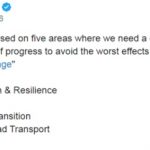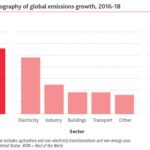To reach the Paris Agreement target of limiting global warming to 1.5°C, the world needs to triple renewable power capacity by 2030. Here, the IEA summarises its report “COP28 Tripling Renewable Capacity Pledge: Tracking countries’ ambitions and identifying policies to bridge the gap”. The report looks at almost 150 Nationally Determined Contributions (NDCs) which set out each country’s plans, and also looks at actual progress (which in many … [Read more...]
Germany, Italy + 10 others not on track to meet their 2030 climate targets, costing them €billions in carbon credits
12 EU countries are on track to miss their 2030 national climate targets by a large margin, according to a study by T&E. That means they will have to buy carbon credits on such a large scale there will be few left for others to buy their way out of missing their own targets (leaving them facing court cases). Germany and Italy are the two worst performing countries, with France on track by a very close margin. Germany will have to pay … [Read more...]
Carbon Pricing annual receipts are almost $100bn globally and rising
About one-quarter of global emissions are, to varying degrees, covered by carbon pricing schemes. They’ve raised over $500bn from polluters to date. Andrew Reid at NorthStone Advisers, writing for IEEFA, summarises his report which says the annual amount raised, now almost $100bn, is set to increase with two-thirds of nations planning to use carbon pricing in their Nationally Defined Contributions. And the EU’s Carbon Border Adjustment Mechanism … [Read more...]
Nations are on track to meet their NDC targets. The catch is those targets aren’t high enough for net zero by 2050
Globally, current Nationally Determined Contributions (NDCs) targets are within reach thanks to the increasing speed of clean energy transitions around the world. That’s as NDCs have, as planned, got more ambitious as nations have updated them every five years. The problem is current NDCs are still not ambitious enough to meet our actual 2050 net zero target. Daniel Wetzel, Gabriel Saive, Luca Lo Re and Alice Latella at the IEA summarise the … [Read more...]
Nearly half of national climate pledges (NDCs) intend to keep extracting fossil fuels
“Nationally Determined Contributions” (NDCs) are a nation’s published plans to reduce emissions and adapt to the impacts of climate change. Natalie Jones at the IISD, writing for Carbon Brief, summarises her co-authored study that reviews the fossil fuel production element of those NDCs. Nations are obliged to update their NDCs every five years, to give more detail. That added detail is a cause for concern in the latest round of NDCs: there is an … [Read more...]
Paris Agreement “Global Stocktake” should focus on individual nations too
It’s time for national governments to focus on the short-term domestic actions needed to meet their 1.5°C goals, argue Anna Pérez Català, Henri Waisman, Marta Torres Gunfaus and Ariadna Anisimov at IDDRI. Analyses of emissions gaps at a collective and global level won’t be enough, the current purpose of the Global Stocktake (GST) of the Paris Agreement. The first GST runs from 2021 to 2023 and the process will be repeated every 5 years. The … [Read more...]
COP26 and the Glasgow Pact: a summary of achievements, and shortfalls
Experts from around the world summarise their reaction to the outcomes of this year’s UN climate summit, COP26, including the Glasgow Climate Pact agreed by all 197 countries attending the talks. Each expert covers their area of interest: overall targets, greenhouse gas emissions, fossil fuel finance, nature conservation, transportation, cities and buildings, energy sector transitions, science and innovation, and gender equality. The overall … [Read more...]
Will COP26 set right the booming Carbon Offset Market
Carbon offsetting is when a company, rather than cut its own emissions, pays someone else somewhere else to cut their emissions. It has always been controversial because it has two main problems. Buying carbon credits means you aren’t putting the effort in to cut emissions yourself. And the risk of double-counting: when the company reports it has cut emissions, and so does the “someone else”. A third problem exists too: measuring whether the … [Read more...]
UK’s COP26 Presidency will be the first big test of its post-Brexit diplomatic skills
November’s COP26 will arguably be the most important since the Paris Climate Agreement of 2015. By then, all signatory nations are required to submit their new and improved nationally determined contributions (NDCs) that set a credible pathway towards reducing their emissions. So far only the Marshall Islands, Suriname, and Norway have done so. Lucien Chabason and Lola Vallejo at IDDRI ask whether the UK teams behind their new COP26 President, … [Read more...]
COP25: the “easy wins” are coming to an end. What now?
Lola Vallejo at IDDRI says the impressive wins we’ve seen so far in clean electrification are merely the easy “low hanging fruit”. Other big sectors like transport, buildings and industry have barely started to transition. As COP 25 convenes in Madrid this week, the world will want to know what promises will be made - via each country’s self-imposed enhanced Nationally Determined Contributions (NDCs) - to meet the Paris goals, because the current … [Read more...]
NDC reporting: making the Paris Agreement Transparency Framework work
For the system of Nationally Determined Contributions (NDCs) to be effective, every country’s reporting processes need to be appropriate to their economic level, honest and accurate. That means the Paris Agreement’s Transparency Framework, including the Common Reporting Tables (CRT) for greenhouse gas inventories, and Common Tabular Formats (CTF) to track progress on their NDCs, needs to be finalised and agreed upon, and fast, says the IDDRI’s … [Read more...]











